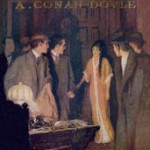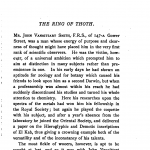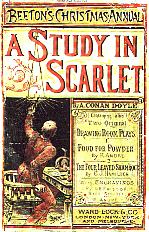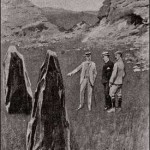“No, we shall find our solution nearer than Scotland. I will tell you what we shall do. You know that skylight which overlooks the central hall? We will leave the electric lights in the hall, and we will keep watch in the lumber-room, you and I, and solve the mystery for ourselves. If our mysterious visitor is doing four stones at a time, he has four still to do, and there is every reason to think that he will return tonight and complete the job.”
“Excellent!” I cried.
“We will keep our own secret, and say nothing either to the police or to Simpson. Will you join me?”
“With the utmost pleasure,” said I; and so it was agreed.
It was ten o’clock that night when I returned to the Belmore Street Museum. Mortimer was, as I could see, in a state of suppressed nervous excitement, but it was still too early to begin our vigil, so we remained for an hour or so in his chambers, discussing all the possibilities of the singular business which we had met to solve. At last the roaring stream of hansom cabs and the rush of hurrying feet became lower and more intermittent as the pleasure-seekers passed on their way to their stations or their homes. It was nearly twelve when Mortimer led the way to the lumber-room which overlooked the central hall of the museum.
He had visited it during the day, and had spread some sacking so that we could lie at our ease, and look straight down into the museum. The skylight was of unfrosted glass, but was so covered with dust that it would be impossible for anyone looking up from below to detect that he was overlooked. We cleared a small piece at each corner, which gave us a complete view of the room beneath us. In the cold white light of the electric lamps everything stood out hard and clear, and I could see the smallest detail of the contents of the various cases.
Such a vigil is an excellent lesson, since one has no choice but to look hard at those objects which we usually pass with such half-hearted interest. Through my little peep hole I employed the hours in studying every specimen, from the huge mummy-case which leaned against the wall to those very jewels which had brought us there, gleaming and sparkling in their glass case immediately beneath us. There was much precious gold-work and many valuable stones scattered through the numerous cases, but those wonderful twelve which made up the urim and thummim glowed and burned with a radiance which far eclipsed the others. I studied in turn the tomb-pictures of Sicara, the friezes from Karnak, the statues of Memphis, and the inscriptions of Thebes, but my eyes would always come back to that wonderful Jewish relic, and my mind to the singular mystery which surrounded it. I was lost in the thought of it when my companion suddenly drew his breath sharply in, and seized my arm in a convulsive grip. At the same instant I saw what it was which had excited him.
I have said that against the wall—on the right-hand side of the doorway (the right-hand side as we looked at it, but the left as one entered)—there stood a large mummy-case. To our unutterable amazement it was slowly opening. Gradually, gradually the lid was swinging back, and the black slit which marked the opening was becoming wider and wider. So gently and carefully was it done that the movement was almost imperceptible. Then, as we breathlessly watched it, a white thin hand appeared at the opening, pushing back the painted lid, then another hand, and finally a face—a face which was familiar to us both, that of Professor Andreas. Stealthily he slunk out of the mummy-case, like a fox stealing from its burrow, his head turning incessantly to left and to right, stepping, then pausing, then stepping again, the very image of craft and of caution. Once some sound in the street struck him motionless, and he stood listening, with his ear turned, ready to dart back to the shelter behind him. Then he crept onwards again upon tiptoe, very, very softly and slowly, until he had reached the case in the centre of the room. There he took a bunch of keys from his pocket, unlocked the case, took out the Jewish breastplate, and, laying it upon the glass in front of him, began to work upon it with some sort of small, glistening tool. He was so directly underneath us that his bent head covered his work, but we could guess from the movement of his hand that he was engaged in finishing the strange disfigurement which he had begun.
I could realize from the heavy breathing of my companion, and the twitchings of the hand which still clutched my wrist, the furious indignation which filled his heart as he saw this vandalism in the quarter of all others where he could least have expected it. He, the very man who a fortnight before had reverently bent over this unique relic, and who had impressed its antiquity and its sanctity upon us, was now engaged in this outrageous profanation. It was impossible, unthinkable—and yet there, in the white glare of the electric light beneath us, was that dark figure with the bent grey head, and the twitching elbow. What inhuman hypocrisy, what hateful depth of malice against his successor must underlie these sinister nocturnal labours. It was painful to think of and dreadful to watch. Even I, who had none of the acute feelings of a virtuoso, could not bear to look on and see this deliberate mutilation of so ancient a relic. It was a relief to me when my companion tugged at my sleeve as a signal that I was to follow him as he softly crept out of the room. It was not until we were within his own quarters that he opened his lips, and then I saw by his agitated face how deep was his consternation.
“The abominable Goth!” he cried. “Could you have believed it?”
“It is amazing.”
“He is a villain or a lunatic—one or the other. We shall very soon see which. Come with me, Jackson, and we shall get to the bottom of this black business.”
A door opened out of the passage which was the private entrance from his rooms into the museum. This he opened softly with his key, having first kicked off his shoes, an example which I followed. We crept together through room after room, until the large hall lay before us, with that dark figure still stooping and working at the central case. With an advance as cautious as his own we closed in upon him, but softly as we went we could not take him entirely unawares. We were still a dozen yards from him when he looked round with a start, and uttering a husky cry of terror, ran frantically down the museum.
“Simpson! Simpson!” roared Mortimer, and far away down the vista of electric lighted doors we saw the stiff figure of the old soldier suddenly appear. Professor Andreas saw him also, and stopped running, with a gesture of despair. At the same instant we each laid a hand upon his shoulder.
“Yes, yes, gentlemen,” he panted, “I will come with you. To your room, Mr. Ward Mortimer, if you please! I feel that I owe you an explanation.”
My companion’s indignation was so great that I could see that he dared not trust himself to reply. We walked on each side of the old Professor, the astonished commissionaire bringing up the rear. When we reached the violated case, Mortimer stopped and examined the breastplate. Already one of the stones of the lower row had had its setting turned back in the same manner as the others. My friend held it up and glanced furiously at his prisoner.
“How could you!” he cried. “How could you!”
“It is horrible—horrible!” said the Professor. “I don’t wonder at your feelings. Take me to your room.”
“But this shall not be left exposed!” cried Mortimer. He picked the breastplate up and carried it tenderly in his hand, while I walked beside the Professor, like a policeman with a malefactor. We passed into Mortimer’s chambers, leaving the amazed old soldier to understand matters as best he could. The Professor sat down in Mortimer’s arm-chair, and turned so ghastly a colour that for the instant all our resentment was changed to concern. A stiff glass of brandy brought the life back to him once more.
“There, I am better now!” said he. “These last few days have been too much for me. I am convinced that I could not stand it any longer. It is a nightmare—a horrible nightmare—that I should be arrested as a burglar in what has been for so long my own museum. And yet I cannot blame you. You could not have done otherwise. My hope always was that I should get it all over before I was detected. This would have been my last night’s work.”
“How did you get in?” asked Mortimer.
“By taking a very great liberty with your private door. But the object justified it. The object justified everything. You will not be angry when you know everything—at least, you will not be angry with me. I had a key to your side door and also to the museum door. I did not give them up when I left. And so you see it was not difficult for me to let myself into the museum. I used to come in early before the crowd had cleared from the street. Then I hid myself in the mummy-case, and took refuge there whenever Simpson came round. I could always hear him coming. I used to leave in the same way as I came.”






